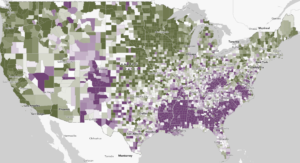
Image Description: “Distributions of adverse birth outcomes across the US, with purple being the worst outcomes, and green denoting the best.”
“Researching The Intersection Between Environmental and Reproductive Rights”
by Carissa Bruton
Last December, I began as a Newcomb RRRH Intern working with Antonia Juhasz in the Tulane Environmental Studies program on a project that encompasses many facets of both reproductive health and environmental justice. I continued this internship throughout this summer, and it has been an extremely illuminating experience.
Throughout this internship, I have conducted literature reviews, investigating past publications that have identified reproductive outcomes related to environmental hazards. I have also worked on transcribing interviews and summarizing historical accounts of community research at the intersection of reproductive health and environmental (in)justice. After completing these tasks, I have written thorough research memos, which has helped me grow my professional writing skills. As I have done this work, I have been able to broaden my understanding of the research process and develop skills that will be extremely useful throughout the rest of my education and career.
I am an undergraduate student in my last semester studying public health, gender and sexuality studies, and sociology, so this internship has allowed me to engage in research at the intersection of my academic, career, and personal interests and passions. I am currently enrolled in the Combined Degree Program through Tulane’s School of Public Health and Tropical Medicine pursuing my Master’s of Health Administration. I hope to use this education to fuel my health administration and management career. In this field, my goal is to help improve gender equity in healthcare, and reproductive justice is a crucial component of this. Thus, this internship has helped me learn about under-researched issues at the intersection of reproductive health, environmental justice, race, class, gender, and more. Moving forward, I will be able to use this knowledge and skills to support the rest of my education and my future career endeavors.
I want to express my deep gratitude to Professor Antonia Juhasz for her outstanding mentorship and support and for taking me on as her research intern. I am thankful to have the opportunity to learn from someone with so much expertise in environmental justice, and it has been an honor to work with her. Additionally, I am so appreciative to the Newcomb Institute for managing the Reproductive Rights and Reproductive Health Internship to allow undergraduate students to learn, grow our experience in the field, and make positive contributions to improving reproductive justice in New Orleans, Louisiana, and beyond. In a post-Roe v. Wade landscape, this is even more vital, and I am committed to advocating for reproductive justice as I move through my career.
